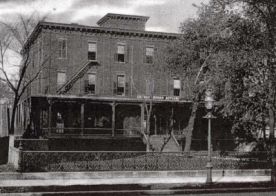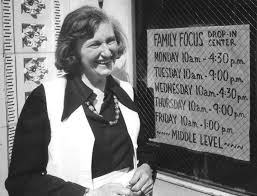Hope-Filled Organizations (Part 4)
Listed below are a number of Hope-Filled Organizations. Additional organizations are added regularly when they are recommended by website readers and when I become aware of them through my own work, reading, and research.
Bridge Communities
Camp One Step
Chicago Furniture Bank
City Harvest
Community Foundation of Northern Illinois
Dolly Parton’s Imagination Library
Donors Choose
Eco-Justice Center
Family Focus
Fields of Sinsinawa
Giving Tuesday
Good Natured Family Farms
Hands On Twin Cities
Happy Trails for Kids
Hope Chicago
Invest in Mental Health
JCUA
Mercy Ships
People Helping People
Plant a Row for the Hungry
Random Acts of Kindness
Red (It All Started Here)
Sarah’s Circle
Share Our Spare
The Courage Project
The Food Conservancy
Tricklebee Café
Urban Growers Collective
Please see Part 3 for other organizations!
Share Your Thoughts
Dolly Parton’s Imagination Library is dedicated to inspiring a love of reading by gifting books free of charge to children from birth to age five, through funding shared by Dolly Parton and local community partners in the United States, Canada, United Kingdom, Australia and Ireland.
Inspired by her father’s inability to read and write Dolly started her Imagination Library in 1995 for the children within her home county. Today, her program spans five countries and gifts millions of free books each month to children around the world.
“When I was growing up in the hills of East Tennessee, I knew my dreams would come true. I know there are children in your community with their own dreams. They dream of becoming a doctor or an inventor or a minister. Who knows, maybe there is a little girl whose dream is to be a writer and singer.
The seeds of these dreams are often found in books and the seeds you help plant in your community can grow across the world.”
In 1995, Dolly Parton launched an exciting new effort, Dolly Parton’s Imagination Library, to benefit the children of her home county in East Tennessee, USA. Dolly’s vision was to foster a love of reading among her county’s preschool children and their families by providing them with the gift of a specially selected book each month.
“Before he passed away, my Daddy told me the Imagination Library was probably the most important thing I had ever done. I can’t tell you how much that meant to me because I created the Imagination Library as a tribute to my Daddy. He was the smartest man I have ever known but I know in my heart his inability to read probably kept him from fulfilling all of his dreams. To listen and see a 1.35 minute video click on this link Letter From Dolly - Dolly Parton's Imagination Library
A pay-what-you-can community café that offers healthy meals, food-service training, & spiritual nourishment.
Our Mission: Tricklebee Café is a pay-what-you-can community café that offers healthy meals, food-service training, and spiritual nourishment. We are a ministry of the Moravian Church in America.
Tricklebee Café is a pay-what-you-can community café that offers healthy meals, food-service training, and spiritual nourishment. We are a ministry of the Moravian Church in America.
What We Offer: We offer a space to foster community, connections, goodwill, and a love for real food with simple ingredients. By offering an inclusive and welcoming space, we bring health, positivity, and peace to our neighborhood.
Our Vision: By providing fresh, healthy, locally-grown food to anyone regardless of ability to pay, we address food insecurity by feeding the immediate need of hunger, while providing resources to educate and inspire people to make a habit of healthy eating. Access to healthy food helps people to better care for themselves and their neighbors, which heals and strengthens community.
Why We Do It: We seek to be a peaceful gathering place in a neighborhood that has experienced violence and neglect. We are a safe, inviting place for neighbors to gather to promote reconciliation and peace. We work to eliminate prejudice and discrimination against the economically and socially marginalized by creating a space where individuals from all backgrounds may gather around the concept of a community table.
OWEE Network: Tricklebee Café is part of the One World Everybody Eats Network along with dozens of cafés across the U.S.
Come Visit Us! We’re located at 4424 W. North Ave. in the historic Uptown Crossing District of the Sherman Park neighborhood. Enjoy our plant-based freshly-made soups, sandwiches, salads, baked goods, and hot drinks. Gluten-free options available daily.
MENU (9/13):
Lentil Tomato Veggie Stew(red & green lentils, roasted tomato, chickpea, zucchini, yellow squash, onion, bell pepper, hominy, jackfruit, kale, sweet potato, plantain, carrot, garlic, quinoa, pumpkin puree, coconut milk, cayenne, & housemade veggie broth)—vegan & GF
Steamed Cabbage (green cabbage, bell peppers, onion, tomato, garlic, fresh oregano, scotch bonnet sauce, apple cider vinegar, & liquid aminos)—vegan & GF
Pâté Toast (multigrain bread topped w/ pâté [mushroom, pumpkin seeds, brown rice, zucchini, onion, shallot], parmesan cheeze, & green onions)—vegan [bread contains wheat]
Masala Chai Chia Seed Pudding (chia seeds, masala chai tea, oat milk, coconut milk, maple syrup, & vanilla)—vegan & GF
Cucumber Pear Lemonade (w/ agave)
Hot Herbal Tea or Hot Green Tea or Coffee
To learn more about this movement, click on this link: One World Everybody Eats
COMMUNITY FOUNDATION OF NORTHERN ILLINOS
The VISION of the Community Foundation of Northern Illinois:
A healthy, sustainable Northern Illinois supported by partnerships fostered by CFNIL.
The MISSION of the Community Foundation of Northern Illinois:
To inspire endowment and promote philanthropy for the current and future needs
of the people of Northern Illinois.
Founded in 1953, the Community Foundation of Northern Illinois (CFNIL) is a regional leader in philanthropy. With more than $140 million in assets and more than 400 individual funds, CFNIL makes grants to charitable organizations and scholarships to local students. CFNIL's grant and scholarship programs are made possible by the generosity of CFNIL's donors.
Our donors come from all walks of life but are united in their commitment to the community and the recognition that their charitable intentions will be preserved for generations through the power of endowment. Endowments at CFNIL are prudently invested and preserved to provide permanent funding for community needs. Over 90% of CFNIL's assets are permanently endowed, meaning that those assets will serve Boone, Ogle, Stephenson, and Winnebago Counties in perpetuity. To learn more about Community Foundation of Northern Illinois, click on the link:
One of CFNIL program which involves young people in the work and decision-making process of CFNIL is the “In Youth We Trust” program.
Granting youth the power to lead and change our community.
In Youth We Trust is a youth philanthropy program of the Community Foundation of Northern Illinois. Established with a grant from the Ford Foundation in 1994 and endowed by a local donor, this program teaches grantmaking, volunteerism, and leadership skills to today’s youth, preparing them to be the positive change of tomorrow.
The In Youth We Trust Council is made up of high-school-age youth from Boone, Ogle, Stephenson, and Winnebago Counties. Council members engage in direct community service as well as philanthropy; the Council is directly involved in the In Youth We Trust Grant Program administration. They help set grant policy, review youth-inspired service project proposals, and recommend the distribution of grant awards. This year, the IYWT Council will distribute up to $40,000 through two grant cycles to community projects that benefit local youth. To learn more about the In Youth We trust program, click on this link: In Youth We Trust | Community Foundation of Northern IL

Investing In Mental Health to Help Break Stigmas and Provide Life-Saving Skills Through Mental Health First Aid™ training
Invest In Mental Health.org - We’re a registered 501(c)(3) non-profit organization. Our mission is to provide free and low-cost Mental Health First Aid training that empowers communities, reduces stigma, and supports early intervention for mental health challenges.
By 2027, we aim to certify 5,000 individuals across the U.S. to build a stronger, more mental health-aware community that prioritizes well-being and recovery.
As a non-profit organization, all donations and support directly contribute to expanding our life-saving Mental Health First Aid programs.
Meet Our Founder – Hi, I’m Loretta. As someone with firsthand experience with anxiety and situational depression, I have seen the growing need for mental health awareness and action. After losing my nephew to a substance-use disorder, I became committed to breaking the stigma surrounding all mental health disorders, not just substance use ones. My mission is to help others become Mental Health First Aiders and provide early intervention skills to support those in need.
Becoming a Mental Health First-Aider - We support an evidence-based Mental Health First Aid certification course, developed by the National Council for Mental Wellbeing. (Click on this link to learn more about this organization National Council for Mental Wellbeing . This early intervention program teaches participants how to recognize and respond to mental health and substance use challenges, and how to provide initial support until professional help is available.
Using community-specific scenarios, activities, and videos, participants learn the 5-step Action Plan (ALGEE) that builds mental health literacy, helping individuals to identify, understand, and respond to signs of mental illness. It equips participants with the knowledge and skills necessary to intervene early, offering support that can make a life-saving difference.
You’ll not only gain practical tools for early intervention but also contribute to breaking the stigma around mental health.

What if we told you, you are changing the world right now? Would you believe it?
A better future is being built by all of us right now, in the billions of small actions we take each day.
Acts of care, love, and understanding extend outward, like the threads of a beautiful tapestry.
Whether it’s offering a kind smile, a helping hand, or an hour of your time—these acts have a way of rippling out, becoming part of something much greater. That is the power of radical generosity.
To view a 1 minute and 23 second video, click on this link: The Power of Radical Generosity
Discover how we're collaborating and innovating to grow generosity worldwide.
About GivingTuesday
GivingTuesday is a global generosity movement unleashing the power of radical generosity. GivingTuesday was created in 2012 as a simple idea: a day that encourages people to do good. Since then, it has grown into a year-round global movement that inspires hundreds of millions of people to give, collaborate, and celebrate generosity.
Join the movement and give, whether it’s some of your time, a donation, or the power of your voice in your local community.
It’s a simple idea: whether it’s making someone smile, helping a neighbor or stranger out, showing up for an issue or people we care about, or giving some of what we have to those who need our help, every act of generosity counts and everyone has something to contribute toward building the better world we all want to live in.
Our Mission
Across six continents, hundreds of thousands of leaders and millions of people work together to change, and in many cases, transform their communities for the better. The GivingTuesday nucleus supports that local impact through networked leadership development in communities around the world; storytelling and strategic communication that uplifts the impacts of generosity; the deployment of human, financial, and social capital to and throughout the movement; and ultimately, the global ritualization of generosity, which has dramatically increased the rate at which people give and volunteer worldwide.
GivingTuesday is invested in communities around the globe with a mandate to propel generosity across every culture, continent, and context.
You can click on this link to go to this group’s website: Home - GivingTuesday
Welcome to Fields of Sinsinawa
Sharing the good news of healthy soil for a healthy planet
We are passionate soil caretakers committed to understanding and sharing how soil care practices can impact not only farm outcomes but also water quality, human health, and community wellbeing.
Mission: Our farmer-led mission is to inspire the informed adoption of holistic soil care practices through collaborative learning, field-scale demonstrations, and meaningful community connections.
Vision: Our vision is a world where holistic soil care is widely practiced, fostering healthy people, vibrant communities, and a thriving planet for future generations.
We Believe
- Caring for the land is sacred work.
- Growing healthy food begins with functioning soil.
- Agricultural systems have the capacity to cycle carbon, protect and/or restore water resources, produce healthy food, and preserve land for future generations.
- Peer-to-peer networking and sharing are the best teachers.
- Open minds and diverse views lead to new insights and understanding.
- No one has all the answers; we are all learners.
Cultivating Common Ground for the Common Good.
There is something special here. Long before the Dominican Sisters came, our Indigenous ancestors called this place Manitoumie, “a place where the Spirit dwells.” In 1847, the Spirit called for something new. Young women of the area were invited to come together by the lone Catholic Missionary of the area, Samuel Charles Mazzuchelli, OP, to teach the children of the immigrant families struggling for a new life in this lead-mining region. This was the beginning of the Dominican Sisters of Sinsinawa.
Sinsinawa Mound continues to be the home and Motherhouse for these sisters. They have treasured this land for its beauty and nourishment for over 177 years. The Sisters farmed some of their land to provide for their own needs, milked their cows, and tended their woods and understood that tending the fields and nurturing the land was an important part of their mission. They became rooted in this driftless region along with those whose ancestors were among the immigrant families they had taught in their early years.
Today, in this time of ecological crises, the Spirit of Sinsinawa calls again: Earth is suffering. Soon she will not be able to provide for her children. The Sisters of Sinsinawa heard that call. The Fields of Sinsinawa will continue their mission of education and service to the community. It is a response to the Spirit’s call to attend to our suffering earth by providing opportunities for others to deepen a commitment to the well-being of present and future generations. To learn more about the work of the Dominican sisters and local farmers, click on this link: Fields of Sinsinawa – A Farmer-Led Learning Center

Food that is Better for Everyone
Our Mission: To bring high-quality local food and food products from sustainable family farms and small businesses to consumers.
Through our sales, we also strive to make these healthy products more available to vulnerable populations via the Food Conservancy.
|
Our Story: We want nothing more than to live on the land and farm it. We want to produce food that doesn't poison the earth or groundwater. We want to use methods that make that food safe and preserve the land for future generations of farmers. There are over 100 family farms and small businesses in our alliance. Some are 3rd or 4th generation stewards of the land who raise their animals humanely and sustainably care for the earth. We have banded together to be able to bring our foods to retailers and restaurants through a robust Local Food partnership with SYSCO. When you purchase Good Natured Family Farms' products, you support the local family farms around the Kansas City area as well as our various "Good Food" charitable endeavors. |
To learn more about this food growing organization, click on this link: Good Natured Family Farms
To view a 5 minute video about starting a healthy farm, click on this link: Practical Tips for Beginning Farmers: Build Strong Networks - YouTube
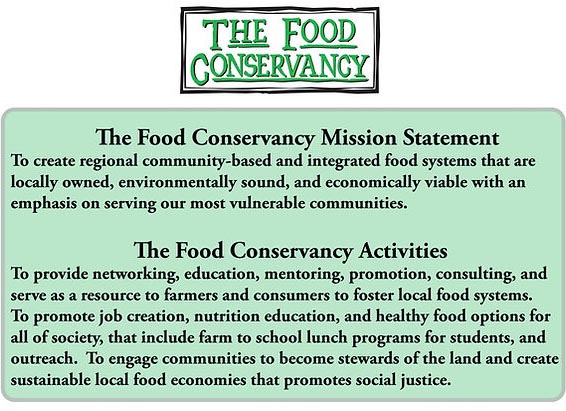
The Food Conservancy is Driven by 3 Main Goals
The FIRST Goal is to get healthy, fresh food into our vulnerable communities. The Food Conservancy is driven to navigate the barriers of accessible, nutritional food due to economic, social, geographical and cultural factors.
The SECOND Goal is to incentivize small and mid-sized farmers to grow and sell more products locally and to receive a fair price. We work to strengthen the sustainability of the local farming community.
And the THIRD goal is to create food chain resilience that anticipates and thwarts potential threats of food unavailability in the Midwest.
To learn more about this organization and the good work they are doing, click on these links: Home | The Food Conservancy and TFC Newsletter Issue 1.pdf - Google Drive
Urban Growers Collective
Building a More Just, Equitable Food System
At Urban Growers Collective, local agriculture is at the root of health, healing & community.
Urban Growers Collective operates eight urban farms over 11 acres of land, predominantly on Chicago’s south side. These farms are production-oriented but also offer opportunities for staff-led education, training, leadership development, and food distribution. Each farm utilizes organic growing methods, intensive growing practices, and year-round production strategies to maximize growing space.
We grow a variety of crops to stock our farm stands, Collective Supported Agriculture (CSA) shares, and the Fresh Moves Mobile Market with a beautiful selection of fresh produce. In addition to fruits and vegetables, we grow culinary and medicinal herbs, edible flowers, and a wide array of ornamental plants for neighborhood beautification. We also raise goats, chickens, and honeybees.
Urban Growers Collective (UGC) is a non-profit 501(c)(3) organization co-founded by Laurell Sims and Erika Allen in 2017. Sims and Allen work closely with community partners to demonstrate the development of community-based food systems. Their work also supports communities in developing local systems to grow, prepare, and distribute food within the community itself.
THREE URBAN GROWERS COLLECTIVE LOCATIONS IN CHICAGO
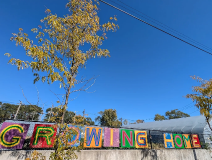
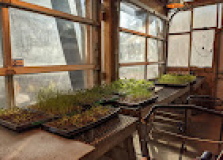

To learn more about the Urban Growers Collective, click on this link: https://www.urbangrowerscollective.org/

The mission of the Chicago Furniture Bank is to provide essential furniture to individuals and families in need.
We believe everyone should be able to sleep in a bed, share a family meal at a kitchen table, and enjoy the comfort of a furnished home.
When families leave shelters and move into permanent housing they do not have many, if any, belongings. Every person should be able to sleep on a bed, share a meal at a table, and do homework on a desk. At the very least, furniture poverty affects one’s quality of life; at worst, it becomes a contributing factor to social exclusion, physical and mental distress, and a return to homelessness.
The agencies that find housing do not have the resources to provide furnishings resulting in families living in empty spaces for extended periods of time or even indefinitely. That’s where the Chicago Furniture Bank comes in.
It has been found that living with furniture can greatly increase home retention rates compared to people living in an empty space.
Around 12.2 million tons of furniture ends up in landfills each year. The Chicago Furniture Bank serves as an intermediary between those who have furniture and those who don’t.
We estimate at least 5,000 households (12,500 people) in Chicagoland live in furniture poverty and need the Chicago Furniture Bank’s service each year.
Turning Empty Houses Into Homes
As of 2025, the Chicago Furniture Bank has furnished over 20,000 homes for over 45,000 people and
Bank provides stability, dignity, and comfort to a Chicagoan in need.
Reduce Environmental Waste
Furniture is the least recycled household item in the US. Every year over 12 million tons of furniture end up in landfills. By distributing gently used furniture that would otherwise be thrown away, the Chicago Furniture Bank has diverted over 3,000 tons of furniture from landfills annually.

The Courage Project Celebrates and Honors
Everyday Acts of Civic Bravery
The Courage Project distributes awards to organizations and honors everyday people for acts of courage and compassion that demonstrate bravery in their communities.
The Courage Project is a bold new initiative honoring everyday acts of civic bravery — the quiet, often unseen actions that uphold our shared values as Americans and strengthen democracy at the community level.
The initiative shines a spotlight on individuals and organizations who take principled stands in the face of adversity. It is supported by a national coalition including: United Way Worldwide, the Freedom Together Foundation, the John D. and Catherine T. MacArthur Foundation, the Marguerite Casey Foundation, the McKnight Foundation, the Public Welfare Foundation, The Skillman Foundation, the Surdna Foundation, The James Irvine Foundation, and CFLeads.
- For organizational awards, local nonprofit organizations will receive recognition for specific actions, whether that’s supporting free speech, championing equality, or building community.
- For individual recognition, recipients may recommend donations to values-aligned American non-profit organizations, seeding civic engagement in their communities and strengthening our democracy.
By allowing recipients to “pay it forward,” the project gives Americans the chance to seed lasting change in their own communities. The award amounts will range from $10,000 to $50,000.
Whether it's a librarian defending free speech, a teacher protecting vulnerable students, or a local leader bridging divides, these recipients embody core national values: kindness, empathy, and community. For individual honorees, The Courage Project also provides an opportunity to “pay it forward” by directing funds to nonprofit organizations aligned with their values – helping to foster long-term impact at the grassroots level.
To learn more about the Courage Project, click on this link: Major Funders and Nonprofits Unite Behind ‘Courage Project,’ Announce Awards

MERCY SHIPS
Globally, 5 billion people lack access to safe surgery. With the support of people like you and me, Mercy Ships deploy hospital ships to combat this overwhelming statistic.
Around the world in places without access to medical care, there are children and adults suffering and dying from treatable causes. Without help, 1 in 11 will die before age 5. Together, we can reach these vulnerable children and families and provide the hope and healing they have been praying for.
Our hospital ships are filled with state-of-the-art medical equipment and a volunteer crew of doctors, nurses, medical staff, technicians, teachers, physical therapists, and other caring people driven by mercy to help make the world a better, healthier place for all.
To learn more about Mercy Ships, click on this link for a 3 minute, 44 second video: Bing Videos

106 years of volunteering services and leadership
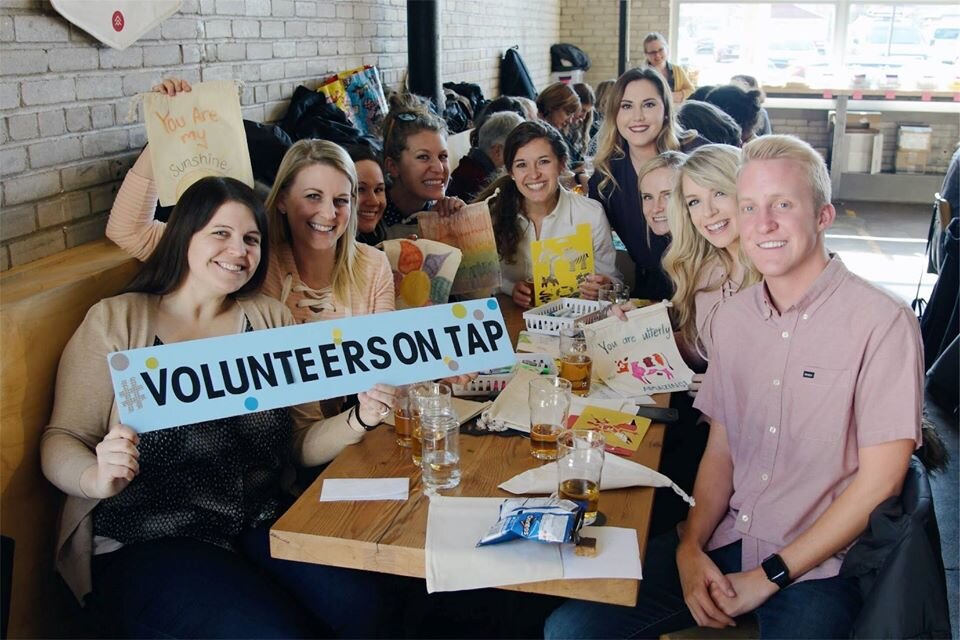
Mission: To realize a thriving, equitable community through purposeful engagement.
Vision: To inspire, equip, and mobilize a movement of people to make a positive difference through community engagement and service.
Our Equity Statement: At HandsOn Twin Cities, we understand that systemic racial inequities have led to the need for the creation of nonprofit organizations. To that end, we participate in active efforts to work against racism's multidimensional aspects.
To actively acknowledge systemic imbalances, we work to ensure that individuals have the opportunities, resources, and support that suit their unique circumstances.
We are constantly striving to create an environment where everyone is a valued, respected, integral part of the whole.
We make space for varied lived experiences and want people to feel comfortable and confident to be themselves.
We are committed to understanding and engaging with difference in all of its many forms.
We continually work to identify and oppose racist ideas, actions, and ways of being throughout the volunteer ecosystem and beyond.
To learn more about this organization, and the wonderful work they are doing, click on this link: About Us | HandsOn Twin Cities
Every family deserves the
chance to succeed.
Hope Chicago is an economic mobility initiative that supports two generations of South and West Side families to and through debt-free postsecondary and workforce pathways all over Illinois.
In February 2022, Hope Chicago partnered with five community high schools on Chicago’s South, Southwest, and West Sides to offer debt-free postsecondary and workforce pathways to every currently enrolled family—students and parents, grades 9-12—in each building.
Building a Prosperous Future: Trades, Professional Certifications, or a Diploma—regardless of the path, education after high school is required to build wealth and compete in today's economy.
Accessing, persisting in, and completing debt-free postsecondary education, training, and credentials is key to creating a more prosperous future for all, especially those in underserved communities.
Hope Chicago is driving systemic change in how Illinois families access and experience education after high school. To view two, 4 to 5 minute videos about the Hope Chicago program, click on these links, one video at a time:
https://www.hopechicago.org/why-hope
https://www.youtube.com/watch?v=bLvFMrcggXM
RANDOM ACTS OF KINDNESS - Colorado Rockies
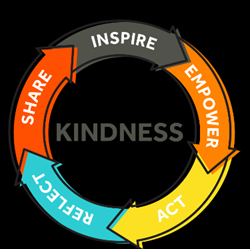
Random Acts of Kindness started in 1982 and has grown to encompass a large group of supporters
In our county and around the world who perform acts of kindness as an important part of their lives.
Here is link to their website: The Random Acts of Kindness Foundation | Welcome
There are many videos of individuals and groups doing random acts of kindness (RAKs)
Here is a link to one of them (6 minutes) which I particularly enjoyed. I hope you enjoy the video also. https://www.randomactsofkindness.org/kindness-videos/17-the-colorado-rockies-on-kindness
Since 1978, Camp One Step has brought happiness, support, strength, and hope to hundreds of campers and their families each year.
Our FREE in-person camps and CONNECTED digital programs serve kids with cancer (whether newly diagnosed, in-treatment, or in remission), their siblings, and even their parents. Inclusion, accessibility, connections and empowerment are core to our mission. At Camp One Step, kids make forever friendships, reclaim childhood, and families feel whole again.
Camp is not a place; it is a community!
Thanks to our community of campers, families, over 400 volunteers, and generous supporters, the magic of camp can be felt anytime, anywhere.
Cancer is an unbelievable weight on a child’s life. At home and at school, physically and emotionally, it changes everything. Their days become increasingly defined by a shuffling between appointments—hospital to hospital, treatment to treatment.
But living with cancer is about more than just cancer, especially for kids—vibrant, loving, tenacious, incredible kids. It’s about living. We saw a need to provide these kids with new and exciting experiences, so we built Camp One Step on these fundamental truths:
• Childhood is invaluable. We give kids the opportunity to run and play, to laugh and learn, to practice a favorite hobby or try something new.
• Community is an incredible source of strength. We offer them a space to meet people and make friends, to share stories and inspiration.
• Our campers are unstoppable. We encourage them to take on the world.
Click on this link to Learn more about our Camps
EMBRACE HOPE
Our holistic HOPE Equation delivers transformative and lasting change for families and communities by focusing on 4 key areas —
Housing
Hunger Relief
Healthcare
Education
For more info about this organization, click on this link: The People Helping People Network
HAPPY TRAILS FOR KIDS
Camping, Connections and Confidence for Children in Foster Care
In 1976, a wonderful boy named David Abrams was stricken with childhood leukemia when he was two years old. He survived cancer but his treatments left him with intellectual disabilities and a person with epilepsy. When it was time for sleep-away camp, because of David’s illness, no camp would have him. So, in 1982, his mom, Pepper Edmiston, started one.
With the help of David’s grandparents, Max and Janet Salter, Camp Good Times prospered and David blossomed. But, by 1993, David’s impairments were so pronounced that his family founded a new program named Happy Trails.
For thirteen years, Happy Trails hosted families who were raising seriously ill or incapacitated boys and girls - either their youngsters by birth or through foster care. Happy Trails celebrated children with challenges and the families who loved them. All of David’s siblings came to camp: his brothers Jon, Matt, Ben, Will and Charlie and his sister Susan.
Susan grew up to become an attorney who represented children in foster care. In 2009, when she took over as president of Happy Trails, Susan focused the mission of the program on boys and girls in foster care with and without disabilities. Her brothers each pitched in: Jon is chairperson of the board; Matt and Ben serve as counselors; Will provides music at the dances and Charlie creates all of the graphic art. As it was from the beginning, camp is a family affair.
On February 22, 2009, early on a Sunday morning, David passed away from an aggressive seizure. Although David suffered from many limitations, his capacity for joy was limitless and his love for his family and for Happy Trails was enormous. To watch a 3 minute about this program, click on this link: https://youtu.be/NdakCs8HgiQ
Consider planting an extra row for the hungry
Donate fresh garden produce to food bank, soup kitchen
By JESSICA DAMIANO, Associated Press, Published: March 29, 2025
This image shows a Plant a Row for the Hungry, Port Washington garden in Port Washington, N.Y. The local organization brings residents together to plant, tend, harvest and donate crops to help alleviate hunger in their community. The national Plant a Row campaign encourages individuals and groups everywhere to plant and donate extra produce for neighbors in need of fresh food. (Marvin Makofsky via AP)
If you’re gearing up to plant fruits, vegetables or herbs this spring, why not grow some extra to donate to your local soup kitchen or pantry?
The national Plant a Row for the Hungry campaign, launched in 1995, has been encouraging home and community gardeners to do just that every year to help feed neighbors in need of fresh food.
The program was spearheaded in 1995 by Anchorage Daily News garden columnist Jeff Lowenfels, who wrote a column encouraging his readers to plant extra crops and donate their harvests.
After seeing the impact that his column had on local food donations, Lowenfels partnered with GardenComm International, then known as Garden Writers of America, to enlist garden columnists all over the country to promote the cause in their own communities.
Since then, more than 20 million pounds of produce, providing more than 80 million meals, have been donated through the campaign by home gardeners.
“All of this has been achieved without government subsidy or bureaucratic red tape — just people helping people,” according to organizers on the campaign’s website. And there’s no big advertising campaign, either — just garden columnists and their readers spreading the word.
If everyone reading this column planted one extra row and donated its harvest, together we could have an impact on hunger.
So what do you say?
To participate, plant an extra row or container (or, if you’re short on space or resources, even just one additional plant) and donate its harvest to your local food pantry, soup kitchen, house of worship or informally to a neighbor who could use it.
If you’d like to help even more, consider starting your own Plant a Row campaign with friends, neighbors or co-workers and plant individually or at the office, in a community garden, school garden, prison garden — whatever garden you have at your disposal.
If you need help getting started, Garden Communicators International GardenComm Home has posted steps for running your own campaign and a listing of existing campaigns to join in your state and town.
But it’s not necessary to join a group. To find food drop-off sites near you, visit https://ampleharvest.org/find-pantry/ and plug in your zip code.
Before dropping off food, call the organization to confirm they accept perishables (soup kitchens are generally more likely to have the refrigeration necessary for storage than pantries or food banks, but there may be exceptions).
CITY HARVEST
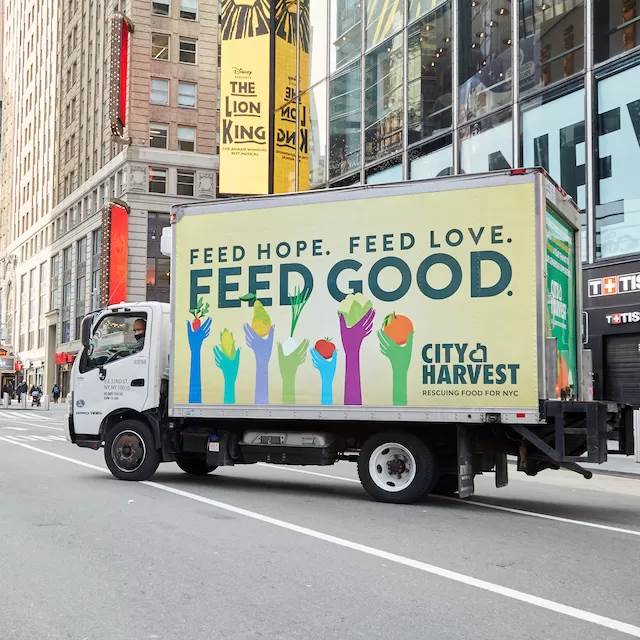
We’re neighbors helping neighbors.
Forty years ago, City Harvest helped start the food rescue movement. Today, we continue to see the tremendous impact food rescue has on our community.
Neighbors across New York City rely on City Harvest to help fill their plates with fresh, nutritious food. This year, we will rescue more than 81 million pounds of food and deliver it, free of charge, to hundreds of food pantries and soup kitchens across the five boroughs to help feed New Yorkers experiencing food insecurity.
But that’s not all we do. We grow the capacity of our partner agencies to help more people, provide nutrition education, strengthen local food systems, advocate for anti-hunger policies, connect volunteers with opportunities to help their neighbors, and more.
Together, we are feeding our city
one day, one meal, one New Yorker at a time.
Click on any one of the links above to learn more about the specific programs supported by City Harvest.
.jpeg)
Since 2006, RED) has generated over $785 million towards the Global Fund’s fight to end AIDS and impacted over 325 million lives. (RED)-supported Global Fund grants help empower health workers and provide testing, treatment and care in places where injustice has enabled pandemics to thrive.
Launched at the World Economic Forum, its purpose was to engage the private sector and its marketing prowess in order to raise funds for the fight against AIDS in Africa. On the back of a napkin, the duo outlined their idea for a unique union of brands and consumers. The plan had three goals:
- Provide consumers with a choice that made giving effortless
- Generate profits and a sense of purpose for partner companies
- Create a source of sustainable income for the Global Fund to fund the fight against AIDS
(RED) was a continuation of work for Africa by U2’s lead singer. In 2002, Bono co-founded DATA (Debt, AIDS, Trade, Africa), a platform to raise public awareness of the issues in its name and influence government policy on Africa. In 2004, DATA helped to create ONE: The Campaign to Make Poverty History. ONE is dedicated to fighting extreme poverty and preventable disease. In early 2008, DATA and ONE combined operations under the ONE organization.
A Clear Purpose (RED) has a clear purpose in its manifesto:
Every Generation is known for something. Let’s be the one to deliver an AIDS free generation.
We all have tremendous power. What we choose to do or even buy can affect someone’s life on the other side of the world. In 2005, more than 1,200 babies were born every day with HIV. Today that number is 400. We must act now to get that close to zero.
(RED) can’t accomplish this alone. It will take all of us to get there –governments, health organizations, companies, and you. When you BUY (RED), a (RED) partner will give up some of its profits to fight AIDS.
It’s as simple as that.
BE (RED). Start the end of AIDS now.
Prior to the launch of (RED), businesses contributed just $5 million to the Global Fund in four years. In a decade since its inception, the private sector, through (RED), has contributed over $350 million. One hundred percent of the funds are invested in HIV/AIDS programs in Africa with a focus on countries with high prevalence of mother-to-child transmission of HIV.
Singer of Irish band U2, Bono (L) poses with Bill Gates at the World Economic Forum annual meeting... [+]
Global brands such as Apple, Nike, Dell, American Express, and The Gap came on board. The appeal of (RED) was clear: it allowed them to tap into a purpose beyond their own profit. Partner brands created special (RED) versions of products and a portion of the profits from the sales would contribute to the Global Fund to fight malaria, tuberculosis, and AIDS.
To learn more about Red, click on this link: https://www.youtube.com/watch?v=j-eqAouNj9k for a 2 minute video.
Mission: Sarah’s Circle provides a full continuum of services for women, including housing, life necessities, and supportive services, to help them permanently end their homelessness.
Vision: Sarah’s Circle envisions a safe and secure home for every woman in Chicago.
History: In 1979, three women in the Uptown neighborhood saw the plight of women who were homeless. They were often cold and seeking shelter, hungry, highly vulnerable, and alone. Sarah’s Circle was started with compassion and spirit of service, and continues to be a safe, welcoming place for women experiencing homelessness. With our resources and services, women are able to access shelter, food, showers, community, and more.
From our humble beginning, Sarah’s Circle has grown to become an agency providing a full continuum of services, but our purpose remains the same. We serve women who are homeless, with a focus on transitioning women from homelessness into permanent housing.
After over 40 years of service, Sarah’s Circle is still growing to meet the needs of women. With the continued loss of affordable housing in our communities, over 2,000 women in Chicago will be homeless tonight. Sarah’s Circle is increasingly focused on permanent supportive housing solutions for these women.
Sarah’s Circle is working to meet this challenge with a new facility, Sarah’s on Lakeside. In this new location, Sarah’s Circle will provide 28 units of Permanent Supportive Housing, more programming space, staff offices, and a demonstration kitchen.
To view a 5 minute, 42 second video of the newest permanent residence and programs, click on this link: https://sarahs-circle.org/

DonorsChoose is a United States–based nonprofit organization that allows individuals to donate directly to public school classroom projects. The organization has been given Charity Navigator's highest rating.
About us | DonorsChoose 1.5 minute video
Our Mission
We make it easy for anyone to help a teacher in need, moving us closer to a nation where students in every community have the tools and experiences they need for a great education.
But we can’t do it alone. Join us!
Our commitment to equity in education: We are committed to combating racial and socioeconomic inequity in school funding. Our team works to inspire as much support as possible for teachers of color and for schools that serve low-income communities and Black, Latino, and Native American students.
Created by teachers, for teachers: In 2000, Charles Best, a teacher at a Bronx public high school, thought about all the money he and his colleagues were spending on books, art supplies, and other materials for their students. They weren't alone — today, teachers still spend an average of $500 out of pocket on their classrooms each year. Charles figured there were people who'd want to help if they could see where their money was going. He founded DonorsChoose, a website where teachers could post requests for classroom resources, and his colleagues posted the first 11 projects. Since then, teachers at most US public schools have requested resources through our platform.
Our team: Our team has vetted and fulfilled over 2 million classroom project requests that range from butterfly cocoons, to robotics kits, to books with diverse characters. Many of us are former teachers, so our operation feels like a cross between a tech company and a classroom. Whether we're in our NYC office or working remotely across the country, you'll find us digging into our data, sharing our favorite projects, and Instagramming teacher and student joy.
Here is an example of one classroom project in a Philadelphia public school. Click on this link to get more specific information about this project. Egg Hatching Exploration: Connecting Students to Birds and Life Cycles | DonorsChoose project by Ms. Holmstrom
Egg Hatching Exploration: Connecting Students to Birds and Life Cycles: Help me give my students in a Title I Philadelphia school a hands-on, experience through the Quiver Farm's egg hatching program, aligning with our current curriculum module on birds and informational texts while fostering curiosity and responsibility.
SHARE OUR SPARE
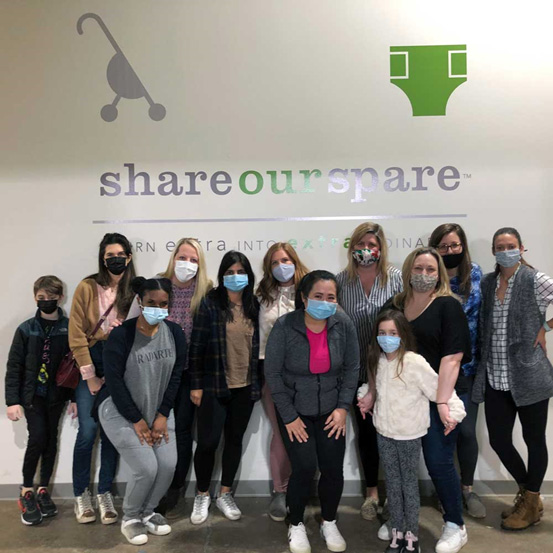
Our Story
Share Our Spare (SOS) was founded in 2011 by area mom, Amy Kadens, and nine other Chicago women with a desire to help local families in need.
After meeting a mother at a North Side food pantry in need of an emergency supply of diapers and formula for her infant daughter, Kadens mobilized her personal network to share any of their spare baby supplies. The response was hundreds of donations from parents eager to help. The following month, Share Our Spare was founded to ensure that no family would have to stress over providing their children the most basic essentials.
SOS received nonprofit status in 2012. First functioning out of Kadens’ garage, operations were moved to a 1,500 sq. ft. office space – which was later expanded to 3,000 sq. ft – and two offsite storage spaces. In 2021, SOS moved into our current 10,000+ sq. ft. Sharehouse to accommodate the significant growth and demand we were experiencing in the new decade. In 2020 alone, as families struggled during the pandemic, we distributed more diapers (1.2 million) than all of our previous eight years combined.
Since our start, SOS has helped an estimated 50,000+ unique children and their families across metro Chicago find support, strength and hope through an agency partner model, which emphasizes wraparound services and empowering upward economic mobility.
To see and listen to a 2 minute and 3 second video about Share Our Spare click on this link: https://www.fox32chicago.com/video/1478557

History
Our story began in 1849, during one of Chicago’s most challenging periods. In response to the devastating cholera epidemic that left countless children without families, the Chicago Orphan Asylum (COA) was founded under the Illinois Special Nonprofit Charter Act. Established to provide care and stability for vulnerable children, the asylum was a critical response to a community in crisis. Over the years, what began as an urgent response evolved into an enduring commitment to the well-being of children and families – a legacy we proudly carry forward as Family Focus.
Our organization evolved to meet the needs of our community, addressing the pressing demands of each era. As the needs of our city shifted, so did we, and in 1949 COA was renamed to Chicago Child Care Society (CCCS). We expanded beyond orphan care to include foster care, adoption services, and eventually, early childhood education and family support programs, all while staying true to our mission to uplift children and support their families.
In 1976, Family Focus was founded through the partnership of Bernice Weissbourd, Delores Holmes, and Irving Harris. During a period when the role of women in society was rapidly evolving and families needed more support than ever, Family Focus began as a parent drop-in center in Evanston. Recognizing the need for comprehensive family support services, Family Focus quickly expanded and became a pioneering leader in community-based family support.
In 2019, Family Focus and CCCS began merger discussions – recognizing that both organizations shared a similar mission while being uniquely complimentary of one another. On January 1st, 2021 we began operations as a merged organization. With combined resources, expertise, and vision, the name Family Focus was chosen because it reflects the heart of our work: ensuring that every family has the tools and resources they need to thrive.
SUPPORTING THE WHOLE FAMILY
Today, Family Focus is proud to operate 11 centers across Chicago and Northeast Illinois, impacting the lives of 20,000 participants via a wide range of services from early childhood education to family health programs, and more. Our award-winning Home Visiting Program exemplifies our dedication to excellence. This program provides families with one-on-one support in parenting, school readiness, and holistic child development, equipping every family to thrive in their unique journey.
|
1849 Orphan Asylum |
Bernice Weissbourd |
Pictured on the left is the original Asylum building at 22nd and Michigan. It initially provided 400 beds for children orphaned by cholera.
Pictured on the right is Bernice Weissbourd, who was one of the original cofounders of Family Focus, along with Irving Harris and Delores Holmes
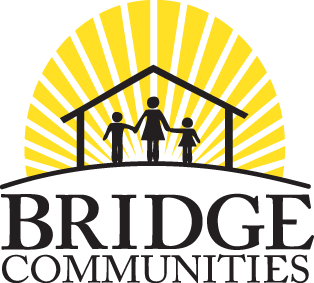
Bridge Communities provides free transitional housing to more than 100 DuPage County families experiencing homelessness each year.
Mission: The mission of Bridge Communities is to transition families facing homelessness into self-sufficiency by working with partners to provide mentoring, housing, and supportive services.
Vision: Our vision is a community where all families are healthy, financially stable, and living in affordable housing.
Values: Each of our core values—Partnership, Empowerment, Integrity, Respect, Hope—apply to everyone involved in Bridge Communities – clients, mentors, program partners, volunteers, donors, board members, staff, and community.
History of Program: When Mark Milligan and Bob Wahlgren first rented an apartment for a family experiencing homelessness, they didn't know that act of kindness would change their lives forever. Decades later, their vision is being carried out by thousands of people who were inspired by Mark and Bob's story to help others in need.

In 1988, the idea to provide housing and intensive life-skills mentoring to families facing homelessness was met with a degree of skepticism. Many doubted that two businesspeople could change how the community responded to and served families experiencing homelessness.
But Mark and Bob's visionary model, joining each family with a volunteer mentor and professional case manager, has changed the lives of thousands. Bridge has grown and expanded its services during the past three decades, but the commitment to creating change in the lives of families experiencing homelessness has never wavered.
Bridge Communities has become a regional and national leader in transitional housing, as well as the surrounding issues that lead to homelessness, such as lack of affordable housing and well-paid labor jobs. Bridge Communities has counseled and mentored many non-profits, churches, and lay-person organizations on establishing a transitional housing program based on this innovative model.
To learn more about Bridge Communities, click on this link: Bridge Communities.
To read about one of the families that was positively impacted by this program, click on this link: Ambar | Bridge Communities.
Racine's 'Hidden Gem'
The Eco-Justice Center continues environmental education efforts
By Caroline Neal, Racine Journal Times, Dec 2, 2024
CALEDONIA — Growing up in Belgium, Wisconsin, Sister Janet Weyker lived on a farm, surrounded by cows, chickens, pigs, and her family’s garden.
Years later, she resided at the Eco-Justice Center in 2004 and said living on the property “felt like coming home.”
This year, the Eco-Justice Center, 7133 Michna Road, is celebrating its 20th anniversary.
Offering tours, field trips, summer camps, and adult programs, the center focuses on education and aims to help mitigate climate change, with features like its own wind turbine, compost bins, and solar hot water panels. Founded by the Racine Dominican Sisters, the environmental center is also home to animals such as alpacas, goats, and chickens.
“We’ve been blessed,” said Weyker, a founder of the center. “In the beginning, when we said this is a center for community, we ended up saying that community is not just the sisters who started it, but it’s all the volunteers and all the visitors and all the friends who helped ... They’re all part of the Eco-J community.”
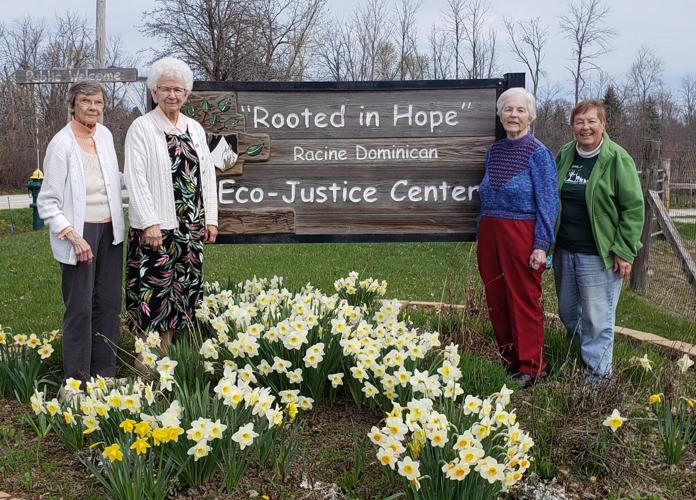
Sisters Rose Marie Dischler, from left, Kathleen Bohn, Maryann Weyker, and Janet Weyker gather at
the Eco-Justice Center entrance. The four Racine Dominican Sisters are the founders of the Eco-Justice Center.
The Beginning: Though the Eco-Justice Center didn’t officially open until 2004, ideas for it were proposed in April 2000 during a weekend event called “Gather the Dreamers.
At the meeting, about 100 Racine Dominican Sisters from around the country discussed what needs the sisters should work on.
One sister noted that the sisters, although dedicated to education and justice, had not yet addressed justice for the earth. Passionate about caring for land and animals as well as people, Weyker, along with five other sisters, resonated with this idea, jumpstarting the process to turn the concept into a tangible plan.
For the next two years, the group met every six to eight weeks. During this time, Weyker studied earth literacy at Saint Mary-of-the-Woods College in Indiana, learning how the world and ecosystems work and the history of how people relate to the land.
From 2002 to 2004, Weyker visited similar organizations founded by sisters, observing their practices, talking to their founders, and then reporting back to the other five sisters.
“Through that, we dreamed up a plan, and we called it the Eco-Justice Center,” she said. “We wanted a place that would show environmental justice (and) sustainability, and we wanted to do that in the context of what we call community — a group of people working together.
”The sisters understood that people lead busy lives, and they wanted the center to be a place for people to walk, sit, relax, and be with nature."
“We strongly believe that unless you get to know a place, you’re never going to love it, and if you don’t love it, you’re not going to take care of it,” Weyker said.
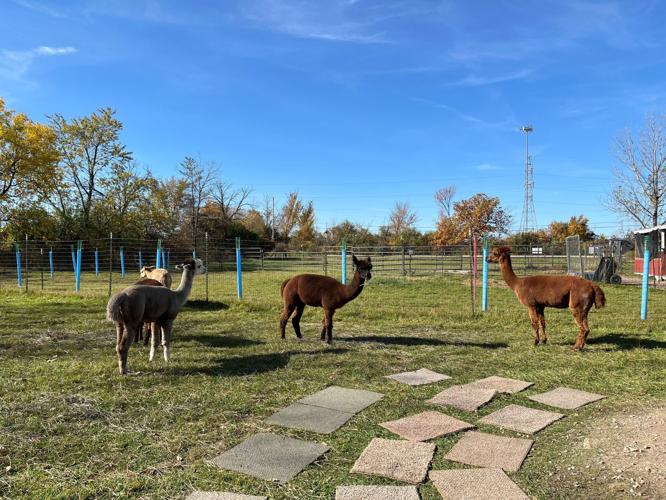
Alpacas have been at the Eco-Justice Center since the beginning. The founding sisters knew they wanted animals on the property but were unsure of what kind. When Sister Janet Weyker studied in Indiana, she learned of alpacas, saying, "They're a very calming creature to watch." The sisters used the fiber for crafts. Photo Caroline Neal.
To read and learn more, click on this link.
JEWISH COUNCIL ON URBAN AFFAIRS
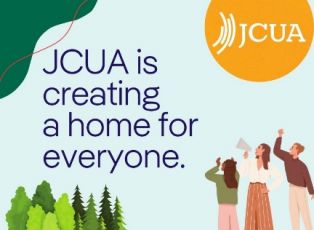
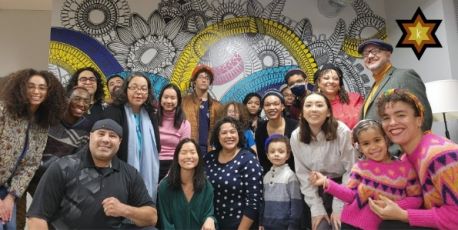
Shana Tovah from JCUA
By Jessica Schaffer
As we welcome Rosh Hashanah and the Jewish new year of 5785, I am writing to wish our cherished JCUA members, supporters, partners, and allies a meaningful year ahead.

Over the past three and a half months as Executive Director, I have had the privilege of talking with many of you about your unique connections to JCUA and the inspirations behind your justice work. With each conversation, I have gained deeper insight into this remarkable community – a community that is thoughtful, inclusive, passionate, and profoundly caring of one another.
I have been especially struck by this community’s vulnerability and strength during this year of great grief and loss. Committed to our core values of Tzedek (justice), Makom (place), and Tikkun (repair), we have stood alongside one another and our neighbors, leaning into the principle of solidarity that we hold dear, and that we know is central to a future where everyone is safe and can thrive.
This year, click on this link to view a 2.5 minute video of the work JUCA is performing, we are reaffirming our commitment to building a city and state that is a haven for all. We are marching onward in our fight toward permanent and affordable housing for all; community-sourced public safety solutions that prioritize care over criminalization; and access to healthcare for all of our neighbors, regardless of immigration status. We know that these goals are only achievable if we all work together, so will you join me this year in the fight for justice and equity on behalf of all Illinoisians?
Let’s make 5785 a year of dignity and safety for all and let us continue to find strength from one another as we co-create a multiracial democracy where everyone can flourish.
Best wishes for a year of peace, joy, and renewed energy for the hard work ahead.
Shana Tova U’Metukah.


